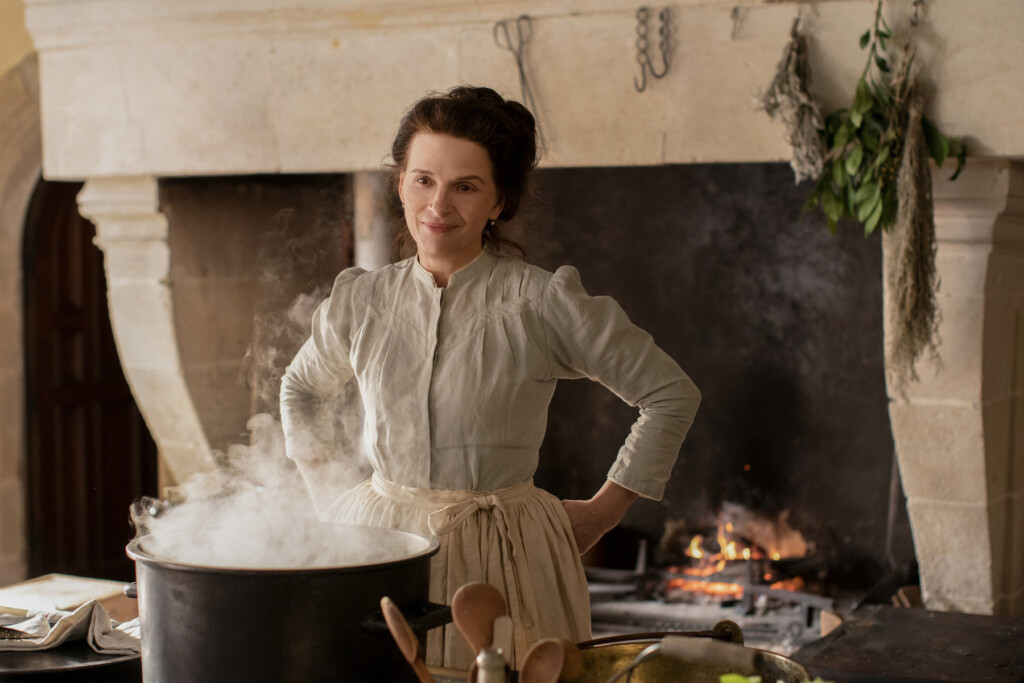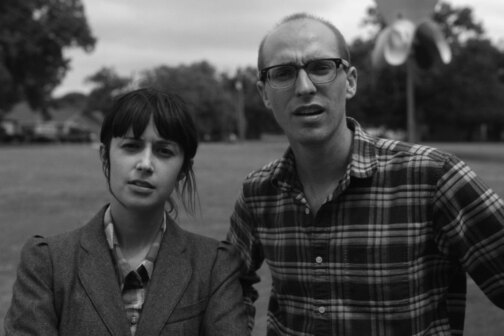We’re dropped into the movie without explanation: somewhere in the French countryside, a group of people are cooking a meal. For a half-hour, we’ll watch them prepare course after elaborate course—an enormous vol-au-vent, turbot poached in milk in its iconic specially-shaped pan, baked Alaska—with only a handful of clues as to who these people are and what meal they’re serving. At first, the film appears to be a story about servants and their masters, until the dinner’s guests break the expected social barriers. There’s a young girl, too: is she their daughter? And why does one of the cooks cry suddenly when she’s preparing the fish?
The answers will be revealed slowly over the course of The Taste of Things, but it’s not really a movie about the plot. It’s also about food only in the sense that Casablanca is about piano bars. The film proceeds as a series of meals being cooked, but each of them has its own meaning. By the end, we’ve become so attuned to the emotions behind the dishes that, watching the characters make one last lunch, instead of feeling hunger we feel heartbreak.
The plot of The Taste of Things is simple enough to explain, once you piece together the clues. Dodin (Benoît Magimel) is the Frenchman whose 1880s home we’re in, and Eugénie (Juliette Binoche) is his live-in cook and his personal partner, though she refuses to be pinned down into marriage. Instead, the duo spends their time preparing lavish meals for Dodin’s hand-selected group of appreciative friends. This life—living in the country, growing everything in an extraordinary vegetable garden, cooking only for chosen guests—is many chefs’ ultimate fantasy. (At least, several chefs here in Texas have expressed that dream to me.)
But things are about to get complicated. A local preteen girl, Pauline (Bonnie Chagneau-Ravoire, in her debut role), is falling in love with food and cooking as a profession. Dodin is invited to prepare a meal for a visiting foreign prince. And Eugénie has reason to fear that her prowess as a cook may be in danger.
That’s about it. Armed with that information, you might guess what happens. But, as Roger Ebert used to say, the crucial thing is not what a movie is about, but how the movie is about it.
In the case of The Taste of Things, that means two intertwined, beautifully rendered subjects. The first, of course, is cuisine. Director Trần Anh Hùng has the camera bob and weave around the cooks, peering over their shoulders at bubbling stews, catching curlicues of steam against the sunlight, quick-cutting from a dish as it comes out of the oven to its final presentation on the table. We hear the crisp snap of puff pastry being sliced, watch vegetables pulled out of the ground, listen to speeches extolling the virtues of great wine. Dodin is also deliciously catty about the elaborate, overworked menu prepared by a rival cook (a cameo by actual Michelin-starred chef Pierre Gagnaire, who also served as a consultant).
The cooking scenes are ecstatically beautiful, and the characters express almost sexual pleasure when they eat. (Hey, this is a French movie. Look at the suggestive shape of the poached pear; listen to the groans and sighs of the men as they chew on ortolan.) For a lot of people, this romantic vision of cooking will be enough to make the movie into a satisfying meal.
But the great food movies are never really just about food. Big Night is about Italian-American cooking—but really about the struggle to adapt dreams that do not come true. Eat Drink Man Woman probes the eternal difficulty that parents and children have communicating with each other. Babette’s Feast places a tragic story about loss alongside a comedic one about temptation. Phantom Thread looks unflinchingly at the pleasure we can find in caregiving, the selfish comfort of needing and being needed.
The Taste of Things is more or less the exact opposite of Phantom Thread. It also focuses on cooking as a nurturing act, but in a sweeter, more innocent way. A psychologist would say that it’s about food as a love language. Neither movie is “right” or “wrong.” They simply take different views.
Ultimately, all the meals in The Taste of Things—from the simple omelets to the caviar-topped tray of oysters—are expressions of love and symbols for the ways its characters interact with each other. That determination to show, rather than tell, means that the movie slowly accumulates power from the first scene to the last. The more we learn about these people and their tastes, the more the movie can reveal about their lives without saying much of anything at all.
By the time the final courses arrive, it only takes a few words for Dodin and Eugénie’s emotions to become overwhelming. By the end, the Valentine’s Day release will make sense. This is a beautifully filmed testament to some luxurious meals—but it’s also a powerful testament to just how meaningful and how personal the title of “cook” can be.
Author






